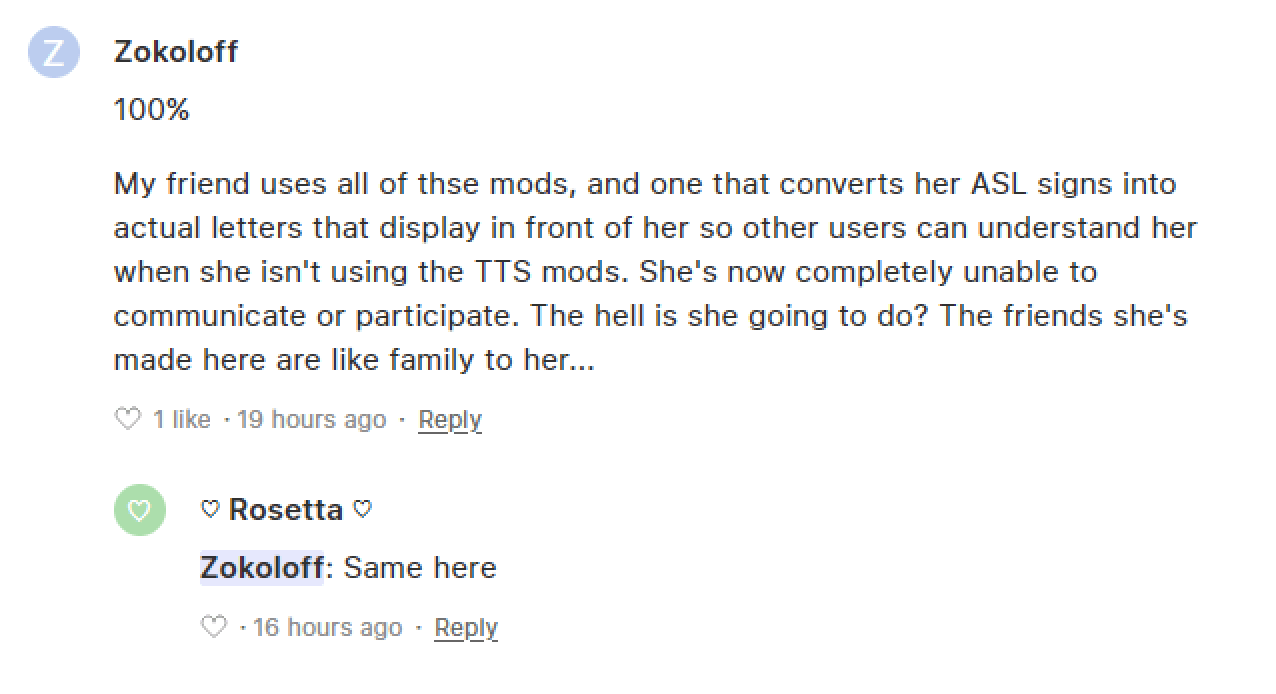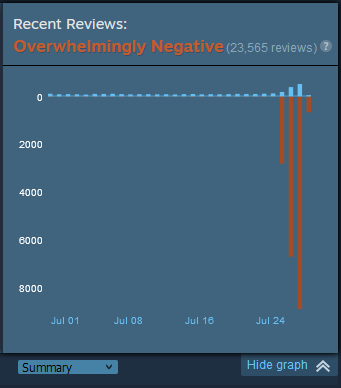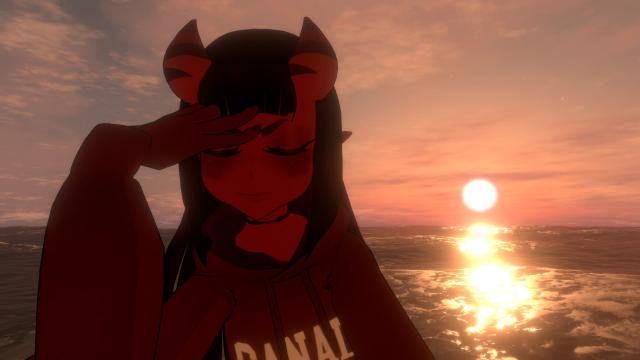VRChat’s had a hell of a week. On Monday, the wildly popular virtual reality social game announced that its next update would implement Epic Games’ Easy Anti-Cheat (EAC) technology, prompting immediate outrage from a large portion of its playerbase. That update landed Tuesday, and since then, VRChat’s struggled to respond to growing fallout among its most dedicated players, some of whom are cancelling their premium subscriptions and threatening to leave for other games.
VRChat, for those who haven’t had the privilege of jumping into what might be the best argument for virtual reality as a medium, is a game where anything can happen. The purpose is to meet other people, but because the game allows you to upload custom content, being social within VRChat can feel like a fever dream. You might pop into a rave where Mickey Mouse and Spongebob Squarepants are grinding, or perhaps dropping into a painstakingly-recreated Taco Bell that’s serviced by Superman and a furry is more your bag. Lauded as the already-existing Metaverse that everyone is racing to build, VRChat is one of the few cutting-edge products out there that still embody the messy freeness of the old internet, back when it wasn’t dominated by the same handful of companies.
And now, one of the core aspects of what made VRChat so great in the first place is in trouble.
On Monday, VRChat announced that update 2022.2.2, officially dubbed “The Security Update,” would institute something called Easy Anti-Cheat (EAC) to crack down on “modified clients,” an expansive term which comprises both malicious hackers running modified VRChat software and everyday players using any of a wide variety of generally benign, community-made modifications meant to improve the user experience. VRChat claimed anti-cheat would make the game “a better and safer place to hang out,” while squeezing out hackers. Unfortunately, banning all client modifications would also largely destroy the game’s thriving underground mod scene, as well as prevent some people from being able to play.
VRChat has always had a contentious relationship with mods, which are officially against its terms of service. Last year, it went as far as banning the accounts of a number of high-profile mod developers for a while. But many players continued to use mods for a wide array of reasons. This led to an unspoken culture of “don’t ask, don’t tell”; mod users could generally avoid bans unless they flaunted their upgrades or otherwise caught moderators’ attention.
What’s more, oftentimes unofficial mods have been the only means by which to access certain features, ranging from support for exotic hardware like advanced trackers and networked sex toys to addressing accessibility concerns like closed captioning and text-to-speech. Also popular were mods that tried to protect against malicious “crasher” avatars, mods that helped to increase framerates in the notoriously sluggish, Unity-based game, and mods that allowed avatar searching, a basic-seeming feature that VRChat still lacks.
@VRChat “VRC-CC” is a mod that adds closed captions to movie worlds so deaf/HH people can watch movies with their friends. VRChat is killing that today by banning all mods. They’ve done absolutely nothing to address serious accessibility gaps on their platform. Please RT pic.twitter.com/DuJSUJCb4n
— Foxipso (@TheFoxipso) July 25, 2022
Despite VRChat’s official disapproval, it’s maintained a dysfunctional yet symbiotic relationship with modders, with user-made mods sometimes pointing the way toward future features in the official client. Such was the case with May’s “IK 2.0” update, which implemented much-improved body-tracking familiar to longtime users of the popular, previously essential IKTweaks mod. VRChat Inc. even has a history of hiring talented mod developers who emerge from the community.
That all in mind, it’s unsurprising that news of what’s effectively a total ban on modding went over poorly with much of the playerbase.
“Don’t think I’ve seen a bigger fuck up in gaming history,” one Twitter user replied to VRChat’s announcement. “This is a social platform with most of your player base using some sort of mod for enhancement, I use camera animations and emm flight to create videos on TikTok/YouTube, in what way is that harming your game?”
“I’ve been working on a video project, writing the script for weeks, commissioned some custom avatars, and this would include the use of the Freeze Frame mod so I can act out lots of characters in VRC by myself,” replied another. “Now that’s gone. Are you JOKING? Please don’t go through with this.”
A smaller number of players tweeted gratitude for the new anti-cheat, including world creators who said they were tired of having to troubleshoot user problems that traced back to mod usage, and players concerned about having their custom avatars “ripped” (stolen) by malicious players lurking in public instances.

In the wake of the announcement, angry players attempted to organise boycotts and commenced a review-bombing on Steam (by Wednesday, “recent reviews” had fallen to “Overwhelmingly Negative”). Players also made their displeasure known on Canny, VRChat’s official feedback platform. Before this week, the most popular Canny ticket ever was “Add Underaged Reporting,” with 2.4k votes (2.9k, now). As of this writing, the main EAC protest ticket, “EAC in a social VR game creates more problems than it solves,” is at 23.2k, followed by “EAC disproportionately punishes deaf and hard-of-hearing users” with 5.4k user votes.
On Tuesday the update went live despite this outcry, and a number of players are pissed to the point of threatening to leave the game. (Others are “just” cancelling their VRChat Plus subscriptions.) Their two most obvious destinations are small-time social VR games ChilloutVR and Neos VR, both of which reached four-digit concurrent player counts for the first time ever on Tuesday. (Both would-be competitors remain dwarfed by VRChat, which reached nearly 90,000 concurrent users this past New Year’s Eve.)
Last tweet of the night.
Chillout VR head developer reports 10,000 people tried to register at the same time, bringing down servers.
This VRChat situation isn’t just a few hundred angry users. pic.twitter.com/mZ5krX0AAx
— 𝙏𝙝𝙧𝙞𝙡𝙡 (@Thrilluwu) July 27, 2022
History’s at play here, too. Players have long felt unheard by VRChat’s developers, and share a widespread perception that VRChat rolls out new features at a glacial pace. That often left unofficial mods as the only way to enjoy certain much-coveted features. Perhaps what stings most this week is the perception that VRChat’s anti-cheat launch hasn’t just blithely disregarded the general playerbase’s desires, but even the needs of players who literally relied on mods just to access the game.
“It’s unacceptable that the VRChat dev team is moving forward with an anti-modding solution that will disproportionately affect deaf and hard-of-hearing people, with massive accessibility gaps in the unmodified game,” user Foxipso wrote in the deaf and hard-of-hearing Canny ticket.
“It’s not really the fact that mods are banned,” wrote another user on the VRChat Modding Group’s Discord. “It’s the complete and utter disregard for community feedback, and unwillingness to adapt the game to fit people’s needs before making sweeping changes like this.”
So in a sense, this week’s events are akin to the straw that broke a long-straining camel’s back.

On Tuesday, VRChat attempted damage control by adding an update to Monday’s Security Update announcement blog. After affirming that the unpopular Security Update was here to stay, it started extending olive branches to the playerbase.
“Since the announcement yesterday, we’ve gotten a LOT of feedback from all of you regarding the incoming 2022.2.2 VRChat update that integrates Easy Anti-Cheat,” it wrote. “We are reprioritizing, reorganising, and changing our internal development roadmap to focus on the feedback you’ve given us.”
It also acknowledged that many players have been left high and dry without their accessibility mods.
“We’ve been talking to VRChat communities and community leaders about the changes and additions that they want most, including speaking to communities focused on accessibility to VRChat,” it wrote. “Our first priority for these changes is addressing several accessibility concerns in VRChat.”
Tuesday’s blog post update concluded by promising an additional update, coming Wednesday, that would share more specifics regarding its updated development plans. It went live on Wednesday evening, about which more below.
“We’ve known that our users frequently use mods to gain added features that are not part of the base VRChat client,” a VRChat spokesperson told Kotaku. “We’ve done our best over the years to add these things into VRChat as we’ve been able. Two good examples are Avatar Dynamics and IK 2.0, both of which were released earlier this year. In many cases, these features had been in the works for a long time, and we really wanted to make sure they were next to perfect before releasing them.”
The spokesperson disagreed with the fairly widespread notion among players that EAC won’t actually help to suppress cheating, suggesting that “an increasing amount of hostile traffic” has been coming from hijacked accounts, whose owners have no idea anything is amiss until they suddenly get banned. They also cited seemingly benign mods that “report back” to a Discord, sharing sensitive information that can then be used to harass the user or their associates.
“EAC would put an immediate stop to both of the above examples,” said the spokesperson. “Likewise, we believe it will help prevent users from [experiencing] harassment (as previously mentioned, some modified clients are used to stalk and attack users), crashing, and more. Improving safety has been one of the biggest requests the community has had for a long time, and with this update, we’re addressing it in a very big way.”
VRChat’s spokesperson also pushed back against the notion that Easy Anti-Cheat could be easily circumvented by hackers.
“While we anticipate that malicious modders will attempt to circumvent EAC,” they said, “we haven’t seen any evidence so far that they’ve been able to do so. In the [event] that EAC was able to be circumvented, however, we’re confident that the EAC team would rectify that immediately.”
They said that EAC has been ready to ship for some time, but VRChat held off in favour of shipping other requested features first. VRChat’s spokesperson said that it couldn’t be put off forever, but even so, it’s unfortunate that some of the game’s most vulnerable users have been so badly impacted.
“Accessibility mods were also unfortunately caught in the crossfire. That’s something we want to rectify immediately,” said the spokesperson. “Many of the accessibility mods that people were relying on were fairly niche — it wasn’t until after EAC released that requests for them spiked. While there are some features that we know users wanted (but we hadn’t gotten to yet), that wasn’t the case with all of them.”

In VRChat’s late-Wednesday blog update, titled “Addressing Your Feedback,” the company laid out its initial plans to officially support several mod-exclusive features that the Security Update wiped out on Tuesday. Among these were a few accessibility features, including accommodations for colour blindness and for users who play while lying down. The blog promised that all hands will be on deck for this effort, which will see new features prototyped and released more rapidly than in the past — mere weeks in some cases, it claimed. Commenting to Kotaku, the spokesperson pointed to VRChat Inc.’s increased hiring over the last year as one factor that will help it push out features more quickly than before.
(Ironically, a little additional relief may come from special user-made accessibility tools that can attach to avatars or be built into worlds, but these require much more per-user technical effort to implement, and are generally far less convenient than were the now-unusable mods.)
On the official VRChat Discord, initial player reaction to Wednesday’s “Addressing Your Feedback” blog seemed mixed at best. It’s clear that this first wave of promised updates will only just begin to start addressing the larger number of players with special needs who’ve been locked out of the game by the forced removal of mods.
Whether this week’s Security Update will go down as a decisive turning point in the history of the VRChat community or just a larger-than-usual blip remains to be seen. But two things are certain: A lot of players are angry, and the Security Update is here to stay.
“Whenever you are taking something from users, it’s always going to cause pain — even when there’s a good reason to do so. In this case, releasing EAC was something we had to do for the safety and security of our users,” said the VRChat spokesperson. “Our goal with this update wasn’t to make our users’ lives more difficult — we’re just trying to make VRChat a safer, more secure place to be. […] Security is never a ‘fun’ update, but it had to be done.”

Leave a Reply